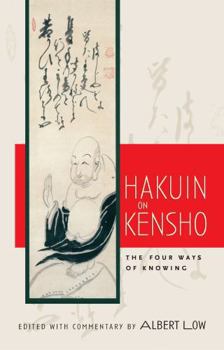Hakuin on Kensho: The Four Ways of Knowing
Kensho is the Zen experience of waking up to one's own true nature--of understanding oneself to be not different from the Buddha-nature that pervades all existence. The Japanese Zen Master Hakuin... This description may be from another edition of this product.
Format:Paperback
Language:English
ISBN:1590303776
ISBN13:9781590303771
Release Date:September 2006
Publisher:Shambhala
Length:144 Pages
Weight:0.65 lbs.
Dimensions:0.4" x 5.6" x 8.4"
Customer Reviews
3 ratings
Post satori training
Published by Thriftbooks.com User , 16 years ago
Deep thanks, Albert Low for this wonderful little book! I have read 'Hakuin on Kensho' several times now and I keep it near me always as a constant and helpful friend in my daily practice. Hakuin in his other writings stresses over and over the importance of post-satori training to strengthen and deepen our vow to save all sentient beings. In this book too, we find him encouraging us, once we break through, to study the scriptures widely in order to broaden our repertoire of techniques for helping sentient beings. Enlightenment is not something we can get and keep! But enlightenment experiences, as Ta Hui and Hakuin, inter alia, remind us are possible time and time again. We keep this deep vow, to save all sentient beings, as trainee bodhisattvas. Hakuin shows us how to embody our experience in our lives and to embody our practice in our lives. Practice-realisation is not confined to the cushion. Deeply comprehending awakening, we truly manifest the compassion of a buddha. Albert Low has given us this gift of a key to understanding.
Zazen, Kensho and Beyond
Published by Thriftbooks.com User , 17 years ago
Albert Low (born in London in 1928), director of Montreal Zen Centre, a Dharma heir of Rochester NY's Philip Kapleau Roshi (author of the classic "Three Pillars of Zen", a well-respected independent teacher and student of Yasutani Roshi), has written a fine commentary on Hakuin's short (ten page) essay "The Four Ways of Knowing". The commentary, including notes and index is 129 pages long. From the title "Hakuin on Kensho: The Four Ways of Knowing", one might think that the essay is about how to know if someone has had a Kensho experience. Rather, it is about the four ways that a progressively deepening enlightenment experience shapes how we experience and interact with and in the world. Stressing the importance of sitting (zazen), he describes the experiences that point to an impending sudden, shattering initial kensho experience of vastness, and the need to continue sitting post-kensho to bring one to the other three ways of "knowing": the experience of everything as your awakened nature (what he calls "knowing equality" or true equanimity), the awareness of the differences (uniqueness) of all things without discrimination (what he calls "knowing by differentiation"), and the ability to act with spontaneity arising from deep knowledge and without self-consciousness (which he calls "the way of perfection of action"). He explains how it can be that someone who has experienced awakening still may have serious personality faults, and how the depth of awakening is related to the amount of effort expended in zazen. Hakuin repeatedly uses the phrase that is translated as "shine through it". Low makes an attempt to explain what it means (diffusing or reducing its power), but I never felt that I truly understood what he was getting at. More than once he uses the word "God", but he uses it in a way that is unfamiliar to this Jew. I suspect that his understanding of "God" grows out of a Catholic/Christian perspective. Hakuin (like Dogen) lightly stresses the need for sutra study and understanding intellectually the differences between the various Zen schools and the Buddha's teaching in the various periods of his life. Combined with the references to the three bodies of Buddha, this essay and commentary seems to sit comfortably in the framework of Mahayana thought. Recommended!
Clarity and Emptiness
Published by Thriftbooks.com User , 17 years ago
As a reader of many works explicating the teachings of Zen and other disciplines, this book is one of the best I've found yet. All of Low's books have this same characteristic simplicity, while illucidating some of the most profound teachings of his tradition. Hakuin's Kensho is a valuable tool for anyone who has been practicing for a while and is seeking to understand who and what it is that knows.






